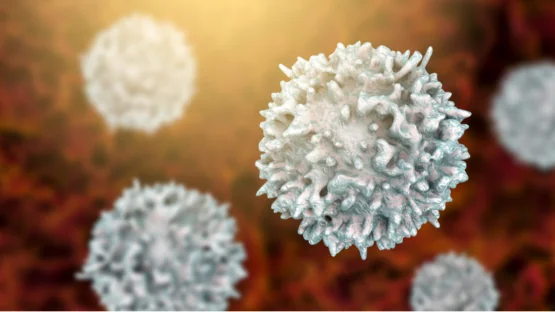A study published in the Nature journal Aging and Mechanisms of Disease has shown that supplementation with nicotinamide riboside (NR) substantially improves the immune systems of older mice due to its effects on stem cell fate. However, the benefits do not persist after NR is removed.
The destiny of blood cells
As the researchers explain, hematopoietic stem cells (HSCs) are driven towards one of three fates: erythroid, myeloid, or lymphoid. Erythroid cells are the well-known, basic red blood cells that carry oxygen to tissues. Myeloid cells are responsible for innate immunity, including macrophages, megakaryocytes (which produce platelets), and neutrophils. Lymphoid cells become the cells of the adaptive immune system: B cells and T cells.
In old mice, the balance of these cells shifts: lymphoid cells are produced in greatly reduced quantities, and myeloid cells increase. After initial experiments with a mouse model of accelerated aging, the researchers investigated NR as a treatment for this condition in aged, wild-type mice.
Substantial, significant results
The experiment on old wild-type mice was fundamentally a success: lymphoid cell fate was increased in old mice with NR supplementation, and myeloid cell fate was decreased, thus restoring the balance more towards youth.
The levels of 11 out of 13 inflammatory cytokines were decreased in aged mice after NR supplementation, many of them dramatically, despite an increase in inflammatory monocytes. Neutrophils, which normally increase with age, were somewhat decreased in treated old mice.
NR had little discernable effect on young wild-type mice in most of these categories. In these mice, lymphoid cell counts were practically identical, and neutrophil count was not decreased to a level of statistical significance. Giving NR to lymphoid cells, even young lymphoid cells, in vitro dramatically decreased their propensity to become B cells, although this was not shown in living animals.
This led the researchers to hypothesize that other signals also have strong influences on cell fate in vivo. They examined what genetic transcriptional changes were occurring in the cells of living animals given NR treatment. They found that myeloid-related genes in cells given NR were downregulated, while lymphoid-related genes were upregulated, showing the broad effects of NAD+ supplementation in living mice.
Withdrawal is a problem
Unfortunately, nearly all of the gains that were experienced by these aged mice were reverted once the supplement was removed from their diet, often leaving them worse than when they started. Neutrophils and inflammation, which were reduced during NR supplementation, were worse after its removal than in untreated wild-type mice. Therefore, the researchers hold that if NR is to be used to combat immune aging, it needs to be taken over the long term.
The researchers also reported not being able to reproduce positive results shown in other studies, such as the change in regulation of genes associated with sirtuins and CD38.
Conclusion
This research provides edifying, if somewhat unwelcome, evidence for the effects of NR and NAD+ repletion on immune cells. While the cell fate and anti-inflammatory effects are difficult to deny, if the immune systems of older people can truly become ‘addicted’ to NR as this mouse study shows, then it is unlikely to be a popular choice for human use. However, this research may lead us towards ways to restore cell fate, and thus youthful immune function, in a more permanent way.





